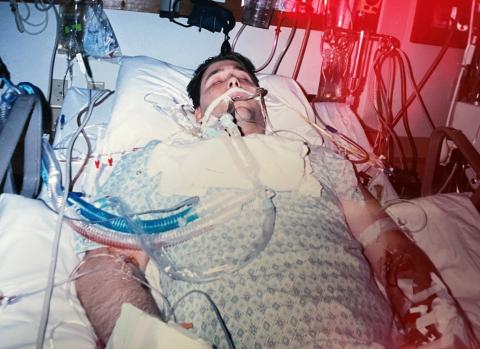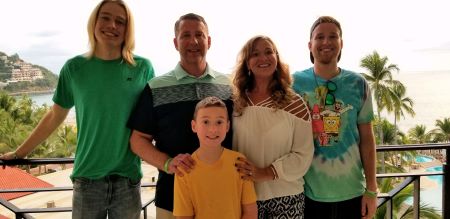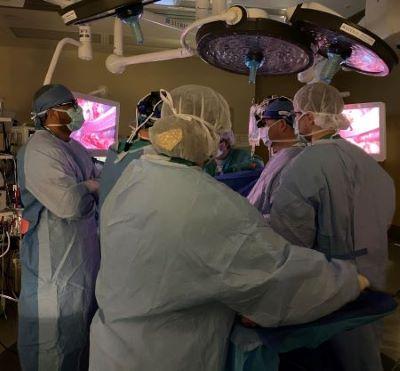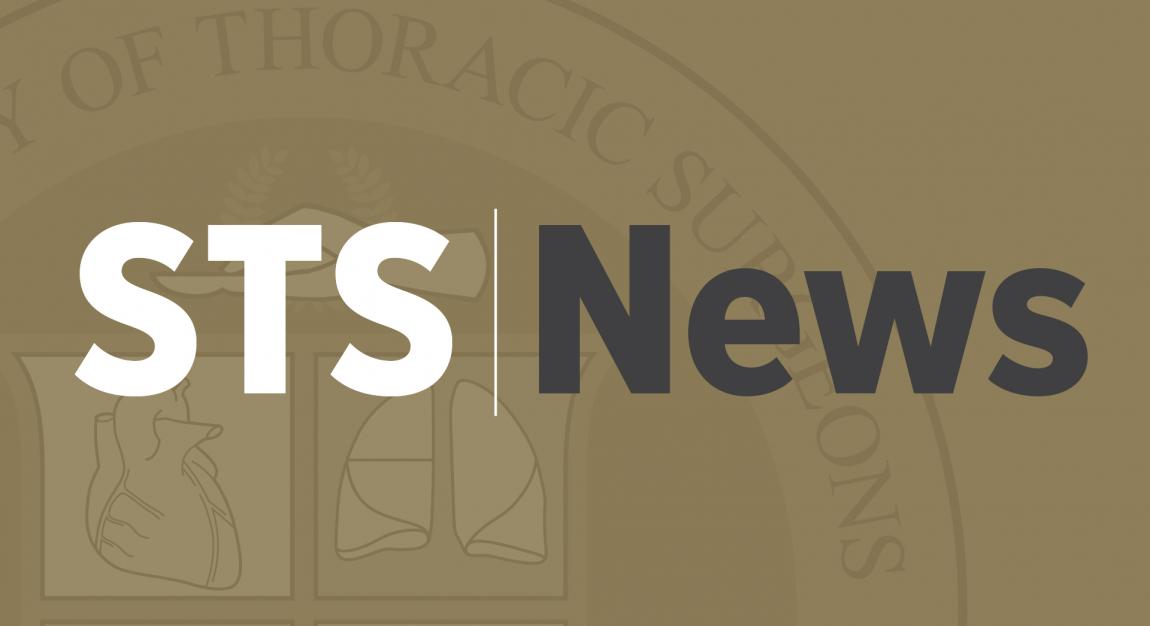STS News, Summer 2022 — Four open heart surgeries and a kidney transplant represent stark milestones for STS member Marcus Balters, MD, whose career as a surgeon has been interspersed with stints as a patient, brushes with mortality, new perspectives on teaching, and solidified faith.
Dr. Balters directs the general surgery residency program and serves as vice chair of surgical education at Creighton University in Omaha, Nebraska. His experiences as a young patient—he underwent a coarctation repair at age 6 and a repeat repair at age 16—made a career in cardiothoracic surgery a natural choice.
“My mother would probably tell you I was talking about being a cardiac surgeon from a very young age, probably 7 or 8,” he said. “I remember thinking my pediatric cardiologist was very cool, and even when I moved on to an adult cardiology group, I was imagining him as my surgeon. I have a memory of him standing over me in scrubs as I was going to sleep.”
Dr. Balters studied medicine at the University of Nebraska Medical Center. In 1999, while a fourth-year resident, he experienced a descending aortic graft rupture.
“This rupture presented as an aortobronchial fistula, and it was very emergent,” he recalls. “I started that morning with massive hemoptysis; I was exsanguinating.”

Dr. Balters credits the world-renowned Lars Svensson, MD, PhD, now at the Cleveland Clinic in Ohio, for saving his life at the Lahey Clinic that day—the first of two such occasions, he’d later discover. Notably, that operation also revealed an ascending aortic aneurysm that warranted a close watch.
“I made it back to residency in about 8 weeks after a very near miss with death,” Dr. Balters said.
He went on to a cardiothoracic surgery fellowship at the State University of New York in Syracuse (SUNY-Syracuse), and from there to a private practice group back in his home state of Nebraska. The group joined Omaha’s Creighton University in late 2005.
A few months later, his aneurysm had grown to the point of needing repair.
“I called Dr. Svensson, and he graciously and adeptly saved my life again in April 2006 at the Cleveland Clinic,” recalled Dr. Balters. “By the grace of God, once again I made it back to work in 8 weeks, and I resumed a very busy clinical practice.”
Being very busy, he now reflects, kept him on a sort of “autopilot,” turning his focus to work, which served as a distraction from what he now recognizes as a form of post-traumatic stress.
“During residency, colleagues would at times take me aside and ask, ‘Are you sure you want to go into this? This is what your life is going to be like.’ And looking back, I realize that I probably spent 10 or 15 years after that third operation wondering, ‘Am I going to die today?’ Every time I would cough, every time I would have a pain, it would remind me of those dramatic events,” he said.
Throughout those years, however, Dr. Balters had a support system that presented him with avenues he’d never considered and with the revelation that it’s okay to lean on colleagues and loved ones, to accept the grace of a higher power, and to employ a little creative assistance.
Another opportunity to broaden Dr. Balters’s viewpoint occurred in early 2006, when he approached the department head to inform him of his plans to undergo the aneurysm repair. “When I had to have that fourth surgery, I went to my chairman and broke down in tears,” he recalled. “He assured me that no matter what happened, even if I could never operate again, there would be a place for me.”
The chair, R. Armour Forse, MD, PhD, suggested that Dr. Balters consider a teaching position, and that recommendation altered the course of Dr. Balters’s professional life.
Meanwhile, Dr. Balters’s wife, Sarah Beth—whom he has known since they were 14 and with whom he celebrated 25 years of marriage this year—was a steady source of spiritual support. “She is the person that lifts me,” he said.

Early in his fellowship, Dr. Balters recalls, he was watching a surgeon deftly perform a procedure, and while observing he had a moment of anxiety about the tremor in his own hands.
“I was thinking to myself, ‘I’m not sure I’m going to be able to do this.’ And right at that moment, without any prompting, my attending said to me, ‘You know, Marcus, I’m resting my hand on the sternum while I do this.’”
Dr. Balters had been so focused on the narrow view through the magnification lenses that he’d never appreciated that his attending surgeon was using a technique to alleviate his own tremor.
Dr. Balters began honing his clinical practice from a mixed bag of cardiac, thoracic, and vascular operations to focus mostly on lung surgery and hemodialysis access at Creighton University Medical Center, now part of CommonSpirit Health, and the Veterans Affairs Nebraska-Western Iowa Health Care System.
The dean of the School of Medicine at Creighton University, Robert W. “Bo” Dunlay, MD, recommended that Dr. Balters turn his talents toward teaching both medical students and general surgery residents.
In the intervening years, Dr. Balters’s kidneys began to fail.
Ultimately diagnosed with idiopathic glomerular nephropathy, he “continued to work the surgeon’s life, though I had stopped doing cardiac surgery back in 2006 when I had the arch repair.” Eventually he required a transplant, and in 2010 he received a kidney from his brother.
“Again, back to work in 8 weeks, though I had multiple issues come up in the next 18 months related to the transplant,” he said. “I have stayed with Creighton—and they have stayed with me—since 2005.”
Dr. Balters has become a source of inspiration for his students and residents.
“I tell them—the students, at least—that I don’t care what kind of doctor they decide to be. There’s of course some satisfaction in ‘converting’ residents to cardiothoracic surgery, but my ultimate goal is to help them be the best doctors they can and save lives. I can only touch so many people in my lifetime as a surgeon, but if I teach people what I think is important, my effects can ripple out to lots of people across years and locations.”
He notes that the students seem to appreciate that he thinks out loud in the operating room. Dr. Balters says that while it’s easy to become silently focused on the task at hand, especially during difficult procedures, he tries to offer insights into his thought processes and decisions by talking them out among the team as he operates.

In 2018, the fourth-year medical student class named him “Most Inspirational Educator” in their yearbook, and this year he achieved the rank of full professor.
And how do his patients benefit from his experiences on—and over—the operating table?
“Once we’ve gotten through the plans for the proposed operation, I’ll say something like, ‘Well, I’ve never had lung cancer, but I’ve had four open heart surgeries and a kidney transplant. And I’m not telling you this because this conversation is about me, but because I want you to know that I’ve sat in those chairs before, and I’ve asked the questions: Why is this happening to me? Who is this person in front of me, and do they know what they’re doing?’”
Dr. Balters answers that he’s just a former kid from Nebraska, but that he’s spent years preparing to be a proficient surgeon, he’s performed hundreds of operations like these, he’s certified by the American Board of Surgery and the American Board of Thoracic Surgery, and he’ll “do everything in my powers to try and make this as uneventful of a valley as possible in what is hopefully an otherwise long and prosperous life.”
A long and prosperous life has realized itself in Dr. Balters, despite a seemingly relentless series of valleys. With his renewed perspective through the lenses of fellowship, family, and faith, he says that he feels blessed.
If you know of a unique member experience that should be featured in STS News, contact the editorial team.
